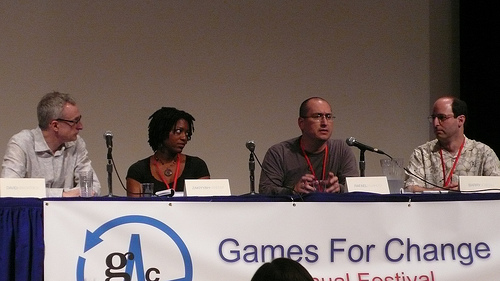I am, I admit, a gloomy person, who spends a lot of time looking at the worst of the world. I am often saved, however, and made a little more hopeful, by the weirdness, creativity, and enthusiasm of kids. Today, in the midst of the financial storm clouds gathering around us, I was able to see some light at a meeting of the Connecticut Innovations Academy (CTIA).
Every year, the Center for 21st Century Skills organizes an Innovation Challenge to bring together Connecticut teens from urban and suburban neighborhoods to collaborate on high tech projects. Last year, the Challenge was to build a video game in MIT’s Scratch program, and build a whole mock company, website, white paper, and marketing campaign to support it. The winners put together a great educational game, but participants complained that they didn’t have enough game design education. This year, the Challenge is basically the same except all game designs will be about environmental issues, organizational kinks have been worked out, and they have dozens of Grow A Game to help spark young imaginations. I went to the program’s first meeting this year to talk to 130-odd students about designing games with values in mind.
26 September, 2008
 Check out local news footage here. Seven people were arrested at a war protest in Northeast Philadelphia this early May at a $12 million military gaming center at a mall which uses simulators (a-la America's Army) to lure in potential soldiers at age 13 and up.
So far the center has recruited twice as efficiently as rival, non-digital centers.
“War is not a game!” "You can't simulate the heat. You can't you know the cries of people who are getting killed. You can't simulate the noise when things are exploding around you," said Jesse Hamilton, an Iraq War Veteran who served in the Army.
The Army Experience Center presents the teenagers with video games in hopes that they might learn about life in the military. At least the Army believes games to be be educational!
Check out local news footage here. Seven people were arrested at a war protest in Northeast Philadelphia this early May at a $12 million military gaming center at a mall which uses simulators (a-la America's Army) to lure in potential soldiers at age 13 and up.
So far the center has recruited twice as efficiently as rival, non-digital centers.
“War is not a game!” "You can't simulate the heat. You can't you know the cries of people who are getting killed. You can't simulate the noise when things are exploding around you," said Jesse Hamilton, an Iraq War Veteran who served in the Army.
The Army Experience Center presents the teenagers with video games in hopes that they might learn about life in the military. At least the Army believes games to be be educational!


